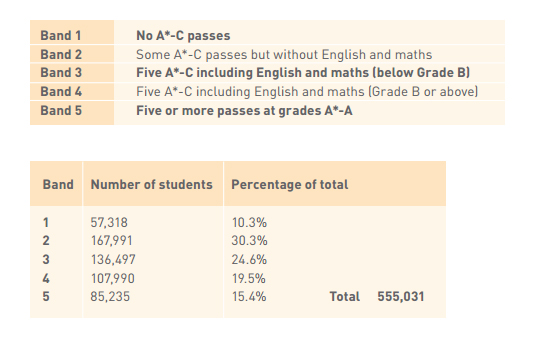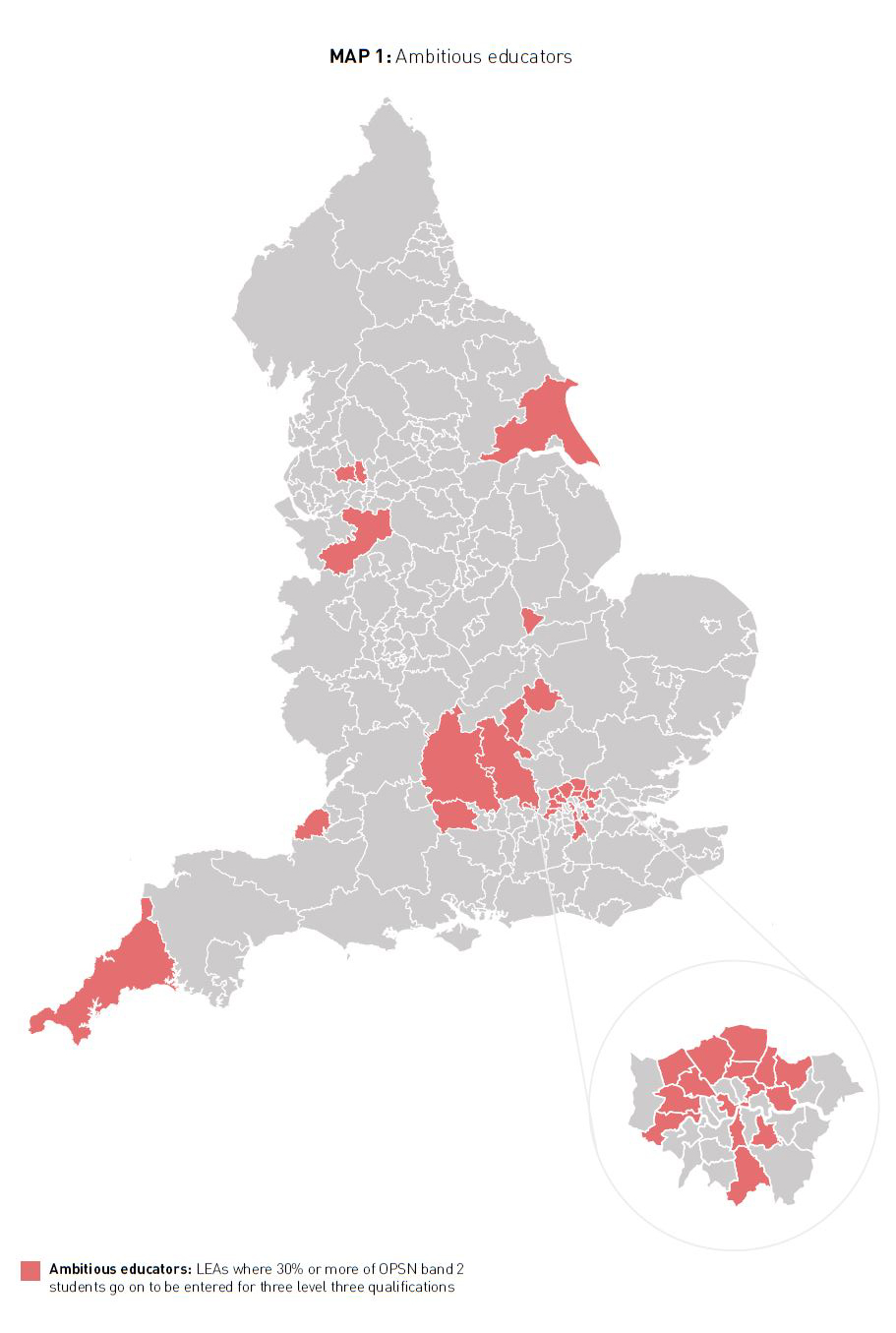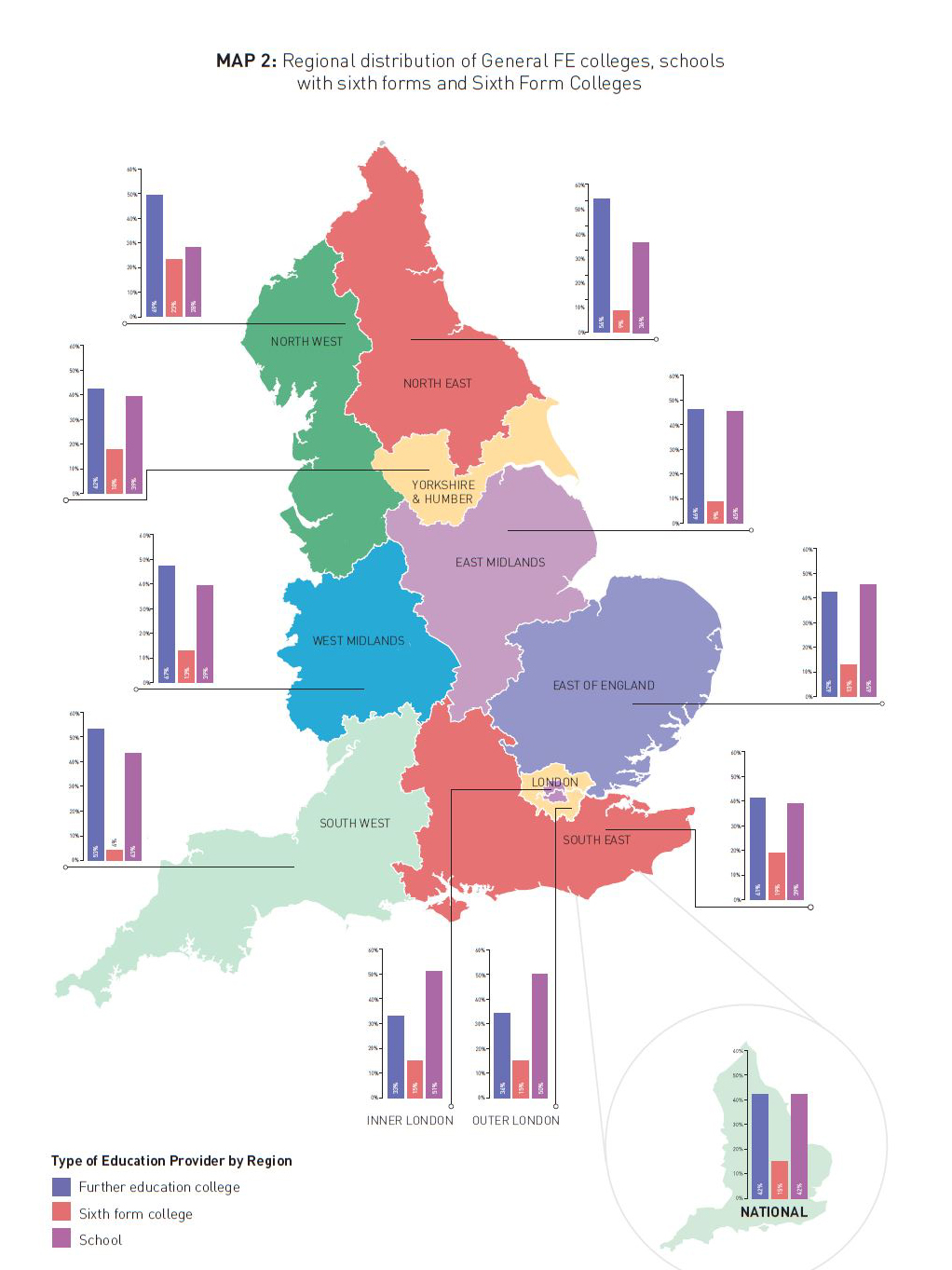The number of children achieving the government’s benchmark five A*-C grade at GCSE level has reduced significantly over the last two years. Our report argues that on this current trajectory we risk losing a generation of talent if schools, sixth form and FE colleges are not adequately supported to ambitiously educate those students who don’t achieve the rigid benchmark for success at GCSE level.
In 2013, 59.2 percent of pupils achieved five or more GCSEs at A*-C. In 2015 the figure had reduced to 53.8 percent. Based on this data, nearly half of pupils are deemed ‘failures’ when assessed against the Department for Education measures. Of the ‘failing’ 40 percent, ten percent did not achieve any A*-C grades at GCSE and a further 30 percent failed to pass in English and Maths, subjects regarded as essential to economic and educational progression. We argue that local leadership and accountabiliy is crucial to help drive up standards, which flies in the face of current government policy on academisation, and could lead to more 'failure' in the school system and wider educational inequality.
However, if the current accountability regime based on ‘high standards’ is to continue, the government should prioritise high-quality vocational and academic pathways and make sure they are made accessible to the 40–50 percent of pupils who don’t achieve the ‘expected’ measure at 16 years old. We have found that these pupils are more likely to study in an FE or sixth form college but we warn Post 16 Area Review Teams that just prioritising schools with sixth forms, where there is evidence they outperform other educational providers, is not the answer.
Charlotte Alldritt, author of the report and Director of Public Services and Communities at the RSA says:
"While much attention is caught up with the compulsory shift to academy status for all schools, our analysis suggests the issues of attainment and accountability go deeper, and must concern the relationship between local schools, sixth form colleges and Further Education providers in offering high quality education and vocational training for young people aged 16-19."
As such, this report highlights local authorities where ‘failing’ students are going on to higher than average rates of Level 3 qualifications, vocational or academic, at Key Stage Five (KS5), as well as areas that are performing significantly below average in terms of encouraging students to take up Level 3 study.
We also looked at the effect of the type of education provider a pupil attends has on what you study and how well a student performs. In a new analysis we banded pupils on the basis of their achievement at GCSE to really tackle the gap between attainment and ambition. We banded pupils 1-5 representing a new way of making local authories and school leaders accountable.

RSA OPSN have identified LEA that have taken up these challenges. We call them ‘ambitious educators’.

LEA include:
- Harrow
- Hackney
- Newham
- Ealing
- Haringey
- North Somerset
- Rutland
- Croydon
- Hounslow
- Slough
- Waltham Forest
- Westminster
- Enfield
- Brent
- Bury
- Buckinghamshire
- Lambeth
- Barnet
- Lewisham
- West Berkshire
- Milton Keyne
- Bedford Borough
- Cornwall, Bolton
- Oxfordshire
- Redbridge
- Cheshire East
- East Riding of Yorkshire
We also focused on the type of provision and provide a regional breakdown:

6 Key Takeaways for policy makers:
- Responsibility should lie with local authorities, not the Department for Education - the Department for Education has to look more carefully at why and how it accounts for the difference in institutional provision. Responsibility has to be placed with local authorities to ensure that there is an appropriate, strategic mix of provision in their areas for post-16 education, taking into account the impact this can have on choices and attainment.
- Local job market links - Post-16 area reviews of local education and training provide an opportunity to assess the structure and quality of provision in an area, and the links to local economic opportunities. Area Review teams should look carefully at their educational institutional arrangements and the impact this might be having on curriculum access and attainment at Key Stage 5 and beyond.
- More contextualised destinations data required - a breakdown of students aged 16 to 18 years taking Level 2 qualifications or below would also be necessary to complete our analysis in the report, particularly as students are also now required to retake GCSE English and Maths until they achieve a C grade.
- Introduce the Friends and Family Test (where service users are asked if they would recommend this school/sixth form college/FE college to a friend or family member) - commonly used in health and social care, this test might be an appropriate starting place for the Department and/or Ofsted to consider in developing a cost-effective equivalent in education.
- Student discouragement - the Department for Education, Ofsted and schools must pay closer attention to the risk of students achieving five A*-C grades including Maths and English (band three, KS4) being discouraged from continuing academic study post-16.
- Sufficient support at Key Stage 5 - Where students are systemically not completing KS5, despite success at KS4, government, local authorities and schools must consider whether sufficient support is in place for all students to reach their potential at KS5 and/or whether we need to be more ambitious for students in setting the bar for GCSE attainment.
Find out more:Open Public Services Network
Twitter: #post16study

Join the discussion
Comments
Please login to post a comment or reply
Don't have an account? Click here to register.
I would argue that (a) we really need to understand why these students fail to thrive educationally (b) why we are waiting until key stage 5 to address their issues (c) and what we could do to get all learners to the stage where they can learn efficiently.
The kind of vocational work that is going to pay a living wage in Croydon, for instance, is not going to be open to a person without Maths and English GCSE, no matter how personable they are.... Future well paid work in Croydon will go to the highly skilled - the growth areas are things like IT. Wages for unskilled or low skilled workers are depressed and have been for a long-time now because of: (a) automation; (b) the global economy and outsourcing to developing countries; (c) a large supply of low-skilled workers.
The mess that the FE sector is in makes the situation for youngsters who struggle to learn worse; but we are not cracking the basic problem of how can we get these young people to a stage where they can access learning and employment opportunities that will offer income equality.